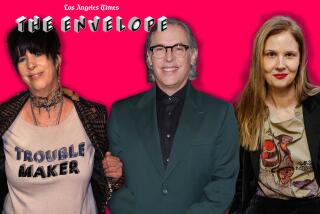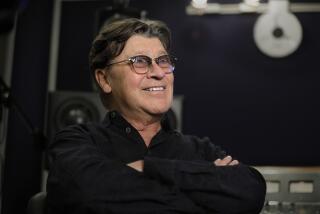How ‘Suicide Squad’ got that pricey, monster soundtrack
It’s fairly uncommon these days for a movie soundtrack to generate massive excitement, let alone sales. With occasional exceptions like “Frozen” and “Guardians of the Galaxy,” the days of platinum-selling soundtrack albums like “Saturday Night Fever,” “Purple Rain” and “The Bodyguard” are largely a thing of the past.
But on Friday, as Warner Bros.’ edgy new comic-book film “Suicide Squad” steamrolled into theaters, the movie’s soundtrack — featuring an eclectic mix of artists including Skrillex, Rick Ross, Kehlani, Lil Wayne, Imagine Dragons and Twenty One Pilots — was released and quickly became the bestselling album on iTunes, a rare cinematic one-two punch of simultaneous chart-topping box-office and album sales.
Stuffed with music from start to finish, “Suicide Squad” mixes hard-hitting hip-hop, moody indie rock and classic rock songs like the Animals’ “House of the Rising Sun” to reinforce the film’s blend of action, antihero angst and dark comedy.
“It’s drama — happy mask, sad mask,” said the film’s director, David Ayer, describing the film’s overall tone. “That’s what I worked really hard on: the emotional peaks and valleys, the moments of elation and fun and also the pathos of it.”

Watch the trailer for “Suicide Squad.”
The instant success of the “Suicide Squad” soundtrack represents the fruit of many months of work for Ayer, music supervisors Gabe Hilfer and Season Kent and the rest of the team behind the film, who set out to assemble a group of musical superstars worthy of a blockbuster about a ragtag band of supervillains.
“From the beginning, we knew this was an awesome opportunity to define ourselves with a big original-song soundtrack,” said Hilfer, whose credits include “Creed,” “Central Intelligence” and TV’s “Black-ish.” “We said, ‘Let’s find songs that match the significance and the size and scope of the film.’ People really gravitated toward us and wanted to be involved from the early stages.”
See the most-read stories in Entertainment this hour »
Early in the process, the “Suicide Squad” team reached out to various record labels and put together a deal with Atlantic Records, which helped corral artists for the soundtrack. Last summer, while the film was still shooting, Hilfer and Kent started screening select scenes for a number of performers, songwriters and music producers.
“The scenes weren’t 100% final but they were a good representation of the tone and the characters,” Hilfer said. “They went back and started writing songs and we got hundreds of submissions. We sifted through them with Atlantic, Warner Bros., David and the producers of the film and decided which ones were the strongest and had the most potential.”
From the outset, Ayer, whose previous films include “Fury” and “End of Watch,” played a key role in establishing the musical foundation of “Suicide Squad,” both in terms of its selection of songs and its darkly hued score by Steven Price.
“It was great having David be so involved and excited about it,” said Kent, who has served as music supervisor on small-screen comic-book series like “Arrow” and “The Flash” as well as films like “The Fault in Our Stars” and “Magic Mike XXL.” “He and Skrillex were texting about ideas and going back and forth. It was so helpful to have the filmmaker in the trenches with us.”
Along with the hip-hop-heavy slate of original songs that make up the bulk of the soundtrack album, Hilfer and Kent set about trying to stock “Suicide Squad” with iconic rock hits from the past.
In the first half-hour or so of the film, as the various characters of the Suicide Squad are introduced, the action is accompanied by one classic rock song after another: AC/DC’s “Dirty Deeds Done Dirt Cheap,” The Rolling Stones’ “Sympathy for the Devil,” Creedence Clearwater Revival’s “Fortunate Son,” Black Sabbath’s “Paranoid,” Queen’s “Bohemian Rhapsody” and on and on.
Securing the rights to all those songs wasn’t always easy. Jack White, who has been highly protective of the music of his erstwhile band the White Stripes, had very specific opinions about how the group’s anthemic 2003 song “Seven Nation Army” should be used in the film. “Jack saw a scene and he got really involved in the clearance, which was cool,” Kent said. “It wasn’t just a matter of sending papers to his representatives.”
Nor was it cheap. Clearing the rights to a beloved hit song for a film is a pricey proposition, easily running into the six figures. Hilfer and Kent decline to say how big a budget they had. But, with an overall net production budget for the film of about $175 million, they clearly had ample resources.
“You know, it’s a big-budget movie,” Hilfer said. “We were just told to hit it creatively.”
For older artists, placing a song in a major film isn’t just about a payday. In a world that’s perpetually drowning in new content, being a part of the musical fabric of a hot comic-book blockbuster like “Suicide Squad” is a great way to maintain your cultural relevance.
“For a lot of musicians these days, it’s a way to expose their music to a younger generation that wouldn’t necessarily be listening to oldies radio,” Hilfer said. “I have a 7-year-old and getting him to listen to the Animals on the radio would be a tough sell. But in the context of a film, he would totally dig it.”
Everyone wants to be part of a winning team. Even if it’s a team of bad guys.
ALSO
Harley Quinn and the Joker’s bonkers ‘Suicide Squad’ costumes are full of insane details
Inside the ‘Suicide Squad’ star tour and why Warner Bros. needs the movie to work, and work big
Review: ‘Suicide Squad’ is a team, and a movie, in search of a mission
‘Suicide Squad’ director David Ayer on unleashing his movie into the ‘Roman arena’ of fandom
Get to know the faces of the ‘Suicide Squad’
More to Read
Only good movies
Get the Indie Focus newsletter, Mark Olsen's weekly guide to the world of cinema.
You may occasionally receive promotional content from the Los Angeles Times.










